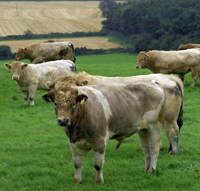Irish call for taxpayer support to boost export earnings

Irish farmers and food exporters are calling for a special “sterling equalisation fund” to be set up by their government to counter the damaging effects that the decline in the value of the pound is having on their earnings.
The proposal has been put together by the Irish Farmers Association and the Irish Exporters Association, who claim that as much as €1bn in food exports and 4400 jobs in the agri-food sector are at risk from the 20% fall in sterling over the past 12 months.
For the wider manufacturing and services sectors, up to €7bn of export business to the UK and as many as 23,500 jobs were at risk, they added.
IFA president Padraig Walshe said the current exchange rate was “unviable” and this was hitting dairy products, beef and mushrooms in particular.
“In the course of 2008, in a deliberate policy by the UK government to gain competitive advantage, sterling fell from £0.73 against the euro at the start of the year to £0.98 at the end of the year and is now at about £0.90.”
The effect means that, for every £5000 of Irish product sold in the UK now, the exporter is receiving about €5500, whereas 12 months ago he would have received €6850.
The IFA and the IEA have therefore devised a scheme which, if adopted by the Dublin government, would counter some of this loss.
They have called for the establishment of a “sterling equalisation support scheme”, to be run by the National Treasury Management Agency.
This would be required to purchase sterling and then guarantee food exporters an exchange rate of £0.80, so that the £5000 of sales would convert back to €6250.
The difference between the market rate and this guaranteed rate would be met by the taxpayer
“While the proposed scheme may involve some cost to the Exchequer indirectly through the NTMA, the cost of doing nothing would be many times greater,” said Mr Walshe.
“Taking the government’s own figure, that every 1000 people being made redundant costs €11 million, the loss of 23,500 jobs would have a cost to the Exchequer of almost €260 million.”
Both the exporters and the IFA have also stressed the problems of accessing credit and have therefore called for a ”state backed credit insurance scheme”, similar to those operating in France, the UK, Belgium and Portugal.
